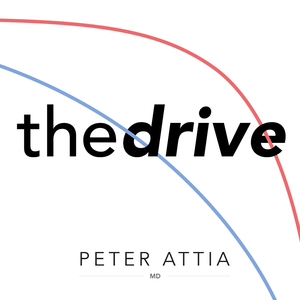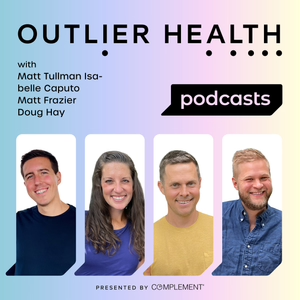
#189 - COVID-19: Current state of affairs, Omicron, and a search for the end game
01/03/22 • 165 min
3 Listeners
In this episode, Peter sits down with Drs. Marty Makary and Zubin Damania (aka ZDoggMD), both previous guests on The Drive. Marty is a Johns Hopkins professor and public health researcher and ZDoggMD is a UCSF/Stanford trained internist and the founder of Turntable Health. This episode, recorded on December 27, 2021, was in part inspired by some of the shoddy science and even worse messaging coming from top officials regarding COVID-19. In this discussion, Marty and ZDoggMD discuss what is known about the omicron variant, the risks and benefits of vaccines for all age groups, and the taboo subject of natural immunity and the protection it offers against infection and severe disease. Furthermore, they discuss at length the poor messaging coming from our public officials, the justification (and lack thereof) for certain mandates and policies in light of the current evidence, and the problems caused by the highly politicized and polarized nature of the subject. Themes throughout the conversation include the difference between science and advocacy, the messaging which is sowing mistrust in science despite major progress, and a search for what a possible “end” to this situation might look like.
NOTE: Since this episode was recorded over the holiday and published ASAP, this is an audio-only episode with limited show notes.
We discuss:
- Comparing omicron to delta and other variants [4:15];
- Measuring immunity and protection from severe disease—circulating antibodies, B cells, and T cells [13:15];
- Policy questions: what is the end game and how does the world go back to 2019? [18:45];
- A policy-minded framework for viewing COVID and the problem of groupthink [24:00];
- The difference between science and advocacy [39:00];
- Natural immunity from COVID after infection [46:00];
- The unfortunate erosion of trust in science despite impressive progress [57:15];
- Do the current mandates and policies make sense in light of existing data? [1:02:30];
- Risks associated with vaccines, and the risk of being labeled an anti-vaxxer when questioning them [1:18:15];
- Data on incidence of myocarditis after vaccination with the Pfizer and Moderna vaccines [1:26:15];
- Outstanding questions about myocarditis as a side effect of mRNA vaccination and the benefit of boosters [1:35:00];
- The risk-reward of boosters and recommendations being ignored by policy makers in the US [1:40:30];
- Sowing distrust: lack of honesty and humility from top officials and policy makers [1:43:30];
- Thoughts on testing: does it make sense to push widespread testing for COVID? [1:52:15];
- What is the endpoint to all of this? [1:58:45];
- Downstream consequences of lockdowns and draconian policy measures [2:05:30];
- The polarized nature of COVID—tribalism, skeptics, and demonization of ideas [2:10:30];
- Looking back at past pandemics for perspective and the potential for another pandemic in the future [2:20:00];
- What parents can do if their kids are subject to unreasonable policies [2:25:00];
- Voices of reason in this space [2:28:45];
- Strong convictions, loosely held: the value in questioning your own beliefs [2:32:15];
- More.
View the Show Notes Page for This Episode
Become a Member to Receive Exclusive Content
Sign Up to Receive Peter’s Weekly Newsletter
Connect With Peter on Twitter, Instagram, Facebook & YouTube
In this episode, Peter sits down with Drs. Marty Makary and Zubin Damania (aka ZDoggMD), both previous guests on The Drive. Marty is a Johns Hopkins professor and public health researcher and ZDoggMD is a UCSF/Stanford trained internist and the founder of Turntable Health. This episode, recorded on December 27, 2021, was in part inspired by some of the shoddy science and even worse messaging coming from top officials regarding COVID-19. In this discussion, Marty and ZDoggMD discuss what is known about the omicron variant, the risks and benefits of vaccines for all age groups, and the taboo subject of natural immunity and the protection it offers against infection and severe disease. Furthermore, they discuss at length the poor messaging coming from our public officials, the justification (and lack thereof) for certain mandates and policies in light of the current evidence, and the problems caused by the highly politicized and polarized nature of the subject. Themes throughout the conversation include the difference between science and advocacy, the messaging which is sowing mistrust in science despite major progress, and a search for what a possible “end” to this situation might look like.
NOTE: Since this episode was recorded over the holiday and published ASAP, this is an audio-only episode with limited show notes.
We discuss:
- Comparing omicron to delta and other variants [4:15];
- Measuring immunity and protection from severe disease—circulating antibodies, B cells, and T cells [13:15];
- Policy questions: what is the end game and how does the world go back to 2019? [18:45];
- A policy-minded framework for viewing COVID and the problem of groupthink [24:00];
- The difference between science and advocacy [39:00];
- Natural immunity from COVID after infection [46:00];
- The unfortunate erosion of trust in science despite impressive progress [57:15];
- Do the current mandates and policies make sense in light of existing data? [1:02:30];
- Risks associated with vaccines, and the risk of being labeled an anti-vaxxer when questioning them [1:18:15];
- Data on incidence of myocarditis after vaccination with the Pfizer and Moderna vaccines [1:26:15];
- Outstanding questions about myocarditis as a side effect of mRNA vaccination and the benefit of boosters [1:35:00];
- The risk-reward of boosters and recommendations being ignored by policy makers in the US [1:40:30];
- Sowing distrust: lack of honesty and humility from top officials and policy makers [1:43:30];
- Thoughts on testing: does it make sense to push widespread testing for COVID? [1:52:15];
- What is the endpoint to all of this? [1:58:45];
- Downstream consequences of lockdowns and draconian policy measures [2:05:30];
- The polarized nature of COVID—tribalism, skeptics, and demonization of ideas [2:10:30];
- Looking back at past pandemics for perspective and the potential for another pandemic in the future [2:20:00];
- What parents can do if their kids are subject to unreasonable policies [2:25:00];
- Voices of reason in this space [2:28:45];
- Strong convictions, loosely held: the value in questioning your own beliefs [2:32:15];
- More.
View the Show Notes Page for This Episode
Become a Member to Receive Exclusive Content
Sign Up to Receive Peter’s Weekly Newsletter
Connect With Peter on Twitter, Instagram, Facebook & YouTube
Previous Episode

Iñigo San Millán, Ph.D.: Zone 2 Training and Metabolic Health (Ep. #85 Rebroadcast)
Today’s episode of The Drive is a rebroadcast of the conversation with Iñigo San Millán, (released on December 23rd, 2019). This episode with Iñigo was one of the most popular discussions to date and is a prelude to an upcoming follow-up discussion in 2022. In this episode, Dr. Iñigo San Millán, Assistant Professor at the University of Colorado School of Medicine, explains the crucial role of mitochondrial function in everything from metabolic health to elite exercise performance. Iñigo provides a masterclass into the many different energy system pathways, the various fuel sources (including the misunderstood lactate), the six zones of exercise training, and the parameters he uses to measure metabolic health. Additionally, he highlights the power of zone 2 training as both an effective diagnostic tool and, perhaps more importantly, as a treatment for mitochondrial and metabolic dysfunction. We discuss:
- Iñigo’s background in sports and decision to focus on education [3:45];
- The various energy systems and fuels used during exercise [11:15];
- Iñigo’s qualification of energy systems into six training zones [19:30];
- Lactate as an important fuel source [29:30];
- Zone 2 training—physiologic characteristics, fuel sources, lactate, and the transition into zone 3 [37:00];
- Using blood lactate levels (and zone-2 threshold) to assess mitochondrial function [43:30];
- Accessing mitochondrial function by testing one’s ability to utilize fat as fuel [51:30];
- Athletes vs. metabolically ill patients—mitochondria, fat oxidation, muscle glycogen capacity, “fat droplets”, and more [56:30];
- Physiologic characteristics of zone 3, zone 4, and the lactate threshold [1:16:30];
- Fueling exercise—dietary implications on glycolytic function [1:27:00];
- Relationship between exercise and insulin sensitivity (and what we can learn from studying patients with type 1 diabetes) [1:43:00];
- Metformin’s impact on mitochondrial function, lactate production, and how this affects the benefits of exercise [2:00:45];
- Raising awareness of the risk of “double diabetes” [2:11:30];
- How to dose zone 2 training, and balancing exercise with nutrition [2:14:30];
- Proposed explanation of the Warburg Effect: Role of lactate in carcinogenesis [2:23:30];
- Doping in cycling, and the trend towards altitude training [2:35:45] and;
- More.
View the Show Notes Page for This Episode
Become a Member to Receive Exclusive Content
Next Episode

#190 - Paul Conti, M.D.: How to heal from trauma and break the cycle of shame
View the Show Notes Page for This Episode
Become a Member to Receive Exclusive Content
Episode Description:
Paul Conti, a returning guest on The Drive, is a practicing psychiatrist and recent author of Trauma: The Invisible Epidemic: How Trauma Works and How We Can Heal From It, in which he offers valuable insights on healing from trauma. In this episode, Paul explains how his personal experience with trauma and his many years seeing patients have shaped his understanding of trauma’s impact on the brain, its common patterns and manifestations, and how often people don't recognize the implications of trauma in their own life. He discusses major challenges in recognizing trauma, including the lack of biomarkers in psychiatry and psychology, as well as the misguidance of the mental health system in targeting symptoms as opposed to root problems. He talks about shame as the biggest impediment to healing from trauma and offers solutions to how, as a society, we can start to change the stigma of mental health and allow more people to receive help. Finally, he concludes with a discussion about the potential role of psychedelics like psilocybin and MDMA in treating trauma.
We discuss:
- Paul’s background and unique path to psychiatry [2:30];
- A personal tragedy that shaped Paul’s understanding of trauma and resulting feelings of shame and guilt [5:30];
- The current state of psychiatry training and need for improvement [20:15];
- The over-reliance on outdated metrics and lack of attention to past trauma as impediments to patient care [28:30];
- Defining trauma: various types, heterogeneity, and effects on the brain [34:30];
- Importance of finding the roots of trauma and understanding the “why” [47:00];
- The major challenge of recognizing trauma in patients [55:15];
- How shame and guilt are barriers to treatment and healing [1:06:00];
- How treating trauma compares to treating an abscess—a powerful analogy [1:11:30];
- How evolutionary survival instincts create problems in modern society [1:15:15];
- First step toward healing: overcoming the fear of talking about past trauma [1:19:00];
- Shame: the biggest impediment to healing [1:25:15];
- The antidote to shame and the need for discourse and understanding [1:34:15];
- The emotional health component of healthspan [1:41:15];
- How to reframe the conversation about mental health for a better future [1:52:00];
- The growing impact of trauma on our society and the need for compassion [1:58:45];
- Society’s antiquated way of treating manifestations of trauma rather than root issues [2:04:15];
- Potential role of psychedelics like psilocybin and MDMA in treating trauma [2:11:15];
- Parting thoughts and resources for getting help [2:16:30];
- More.
Sign Up to Receive Peter’s Weekly Newsletter
Connect With Peter on Twitter, Instagram, Facebook & YouTube
If you like this episode you’ll love
Episode Comments
Featured in these lists
Generate a badge
Get a badge for your website that links back to this episode
<a href="https://goodpods.com/podcasts/the-peter-attia-drive-22593/189-covid-19-current-state-of-affairs-omicron-and-a-search-for-the-end-18697526"> <img src="https://storage.googleapis.com/goodpods-images-bucket/badges/generic-badge-1.svg" alt="listen to #189 - covid-19: current state of affairs, omicron, and a search for the end game on goodpods" style="width: 225px" /> </a>
Copy




